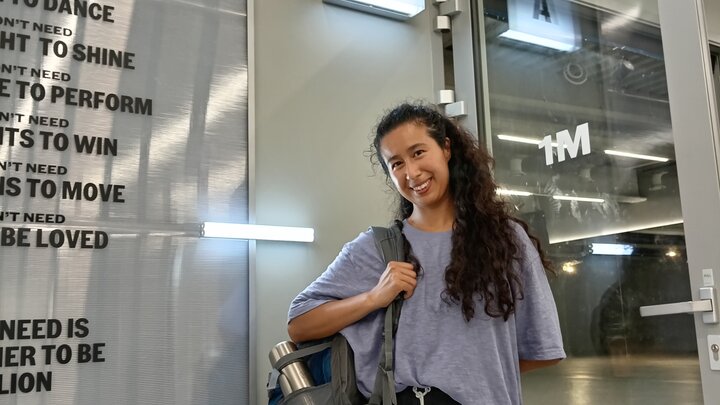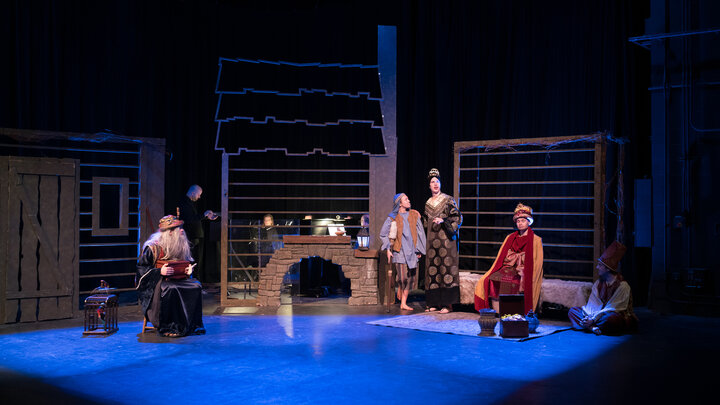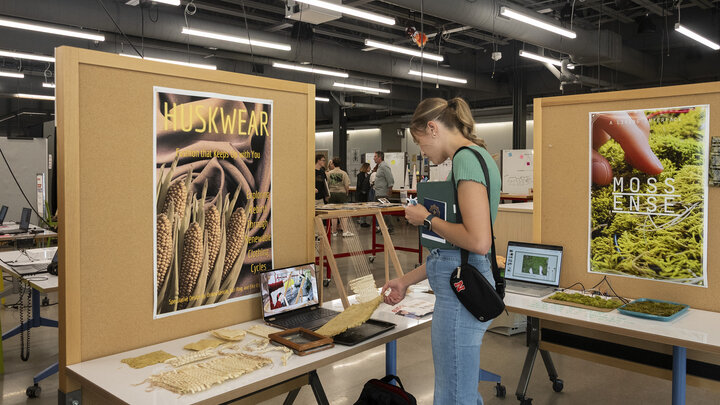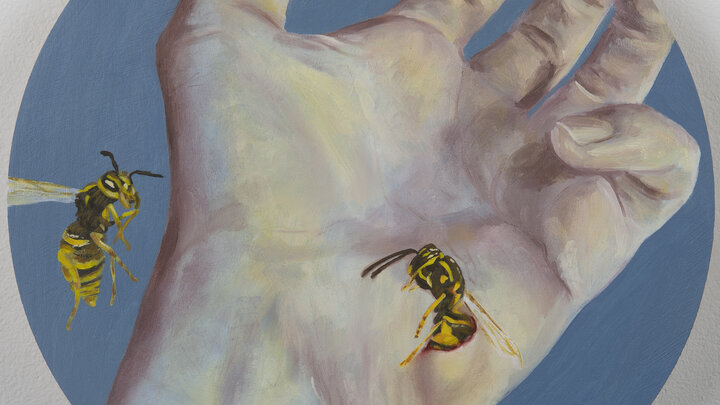Lincoln, Neb.--Mariela Hernandez, a post-baccalaureate dance major and anthropology minor, traveled to South Korea this summer for summer abroad courses and to further her research into K-pop dancing communities.
“I got really excited because I had started practicing K-pop dance and K-urban dance independently because I really enjoy it. And those two semesters before that summer, I was doing all my research projects in dance and anthropology classes about Taiwan, China, South Korea and Japan. So it was like everything was aligning. I was really excited that this opportunity happened,” she said.
Hernandez participated in the University of Nebraska–Lincoln faculty-led study abroad program “Nebraska Abroad: Korean Global Wave in South Korea,” led by School of Global Integrative Studies Lecturer Chris Heselton and hosted by Dankook University. She took beginner Korean and Global Studies 391 Experiences Abroad.
In the evenings, she took dance classes at 1 Million Dance Studio, where she attended 22 sessions and met 14 choreographers and two urban dance crews. Among the styles taught were house, hip-hop, K-pop, waacking, locking and hybrid choreographies.
Associate Professor of Practice in Dance Hye-Won Hwang said K-pop has gained a global popularity since the turn of the 21st century and has become a popular topic to study in various academic fields.
“As a Korean-born dance scholar, I was excited that Mariela traveled to South Korea this summer to participate in K-pop dancing communities at the 1 Million Dance Studio,” Hwang said. “She expressed to me that her experience tremendously helped her define her future ethnographic research direction and would like to re-visit to South Korea to further investigate international dancers’ K-pop dancing experiences at urban dance studios in South Korea.”
Hernandez wanted to pursue something that combined all of her interests while she was there. Her project is titled “Mapping K-Pop Dance Communities: The Case of 1 Million Dance Studio in Seongdong-gu, Seoul, South Korea, and How It Transformed into a Global Community.”
“In that last year, I was doing some research into specific dance practices in different cultures,” she said. “But I realized that if I have a chance to go to this program, I wanted to do something that was related to my dance practice and can give me an opportunity to integrate knowledges. I was really interested in trying the tools I acquired in my minor in anthropology, but also a little bit of the performance studies that I acquired in my degree in theatre and the new tools that I also gathered in the dance program. I love to do participant observation. I love to talk about communities. And I love spaces that gather communities of dancers and movers. I think they’re very special places.”
Hernandez had followed 1 Million Dance Studio on YouTube and social media and liked their choreographers.
“I realized that most of the choreographies I was practicing in the last two years were mostly from 1 Million,” she said. “And I observed in the media platforms that there were a lot of people from different backgrounds and different ethnicities. I thought that maybe this is a friendly space for people to join.”
Seeing this community of dancers was inspiring to her.
“I love to see people from multiple places there, and I love to hear people speaking different languages around me,” she said. “It was something I hadn’t experienced before, and it was really nice. We can connect through dance and movement. That was very touching. I also started to grasp a different concept of how to learn choreography, and it was more connected to the rhythm, and that was very interesting to me.”
Two particular choreographers she enjoyed taking classes from were Crowe and Noh Won.
“I love the way both of them teach,” she said. “Crowe does not speak English, and Noh Won speaks Japanese, Korean and English, so it was an interesting class. Her class is very energetic, and both of them are so supportive.”
Hernandez was curious about these communities forming connected by urban dances or Korean urban dances.
“I frame my curiosity thinking also about globalization, which is a topic that we were reflecting on in the study abroad class,” she said. “In my project, I decided that I was only going to work with 1 Million Dance Studio. I wanted to understand better if this was a local community that is now renowned globally, or if it was actually a global community that has a space to gather there. I was really surprised that there were so many people traveling just to be a dancer there. I wanted to know what were the motivations, but also how this dance studio makes it possible.
She didn’t have clearance to interview people on this trip, so she relied on observation and archival research.
“Apparently a lot of people get to know the studio because of their social media,” she said.
She anecdotally met one person from Mexico who had saved money for four years to take classes there for a month.
“I can relate with that,” Hernandez said. “Without the scholarships, grants and extra hours of work, this would not have been possible for me.”
She intends to pursue the research further and has applied for a Fulbright grant to spend 10 months of further research in South Korea.
“I wanted to expand the research, and this time be able to also do interviews with people,” she said. “I want to develop a cross-cultural study and follow the pathway of some of these dancers that are migrating, and then observe what are these practices that are being exported or not and how does that happen?”
In October, Hernandez presented information on her experience at a First Friday event at the Johnny Carson Center for Emerging Media Arts.
“Last October, we had our very first undergraduate panel presentation as part of our First Friday event,” Hwang said. “There, Mariela presented her research on K-pop dancing communities at the 1 Million Dance Studio and discussed how that studio has become a global community through multiple social media platforms. I could tell how passionate she was on this topic while she was giving her speech.”
Hwang said Hernandez is well equipped as a researcher.
“As an advanced undergraduate student, Mariela is well-equipped with research tools to formulate reasonable research questions, collect data, and analyze outcomes,” Hwang said. “During her college years at UNL, Mariela has written papers that look at dance from cultural, political, transnational, anthropological, and gender perspectives. Her cross-cultural, interdisciplinary, and global scholarly endeavors are impressive and inspiring.”
Hwang said she has enjoyed working with Hernandez in her dance history, theory and practice classes.
“Mariela is a beautiful dancer, thoughtful choreographer, critical thinker, and sophisticated speaker who inspires her peers and instructors in her own unique way,” Hwang said. “She has a natural curiosity and gift for incisive thought that makes her a life-long student of high potential.”
Hernandez said this was a very meaningful experience for her.
“This experience helped me realize that I'm ready to do fieldwork,” she said. “I feel more confident in myself and my skills as a researcher, and I became more aware of the challenges that working in cross-cultural studies might bring. It's always a little more challenging when you want to go further out of your comfort zone. I want to improve a lot, because I aim to share narratives about movement and dance ethically and responsibly, that motivate people to shape the dance landscapes in their communities.”



